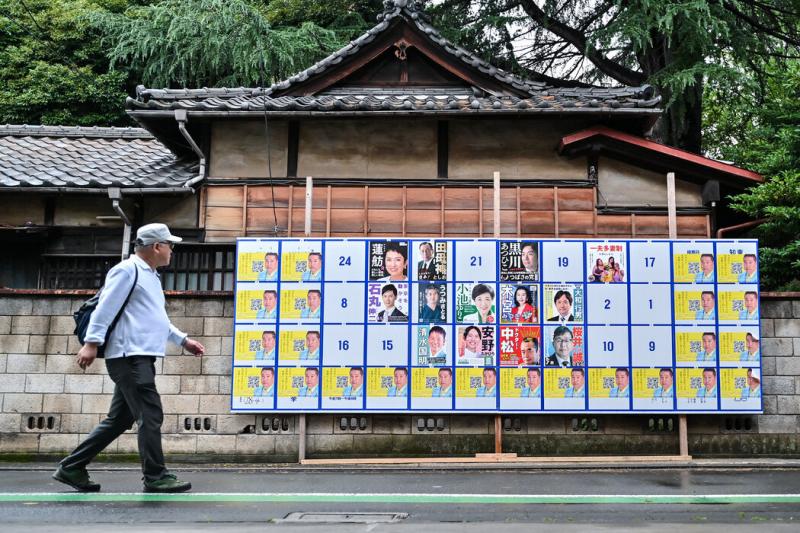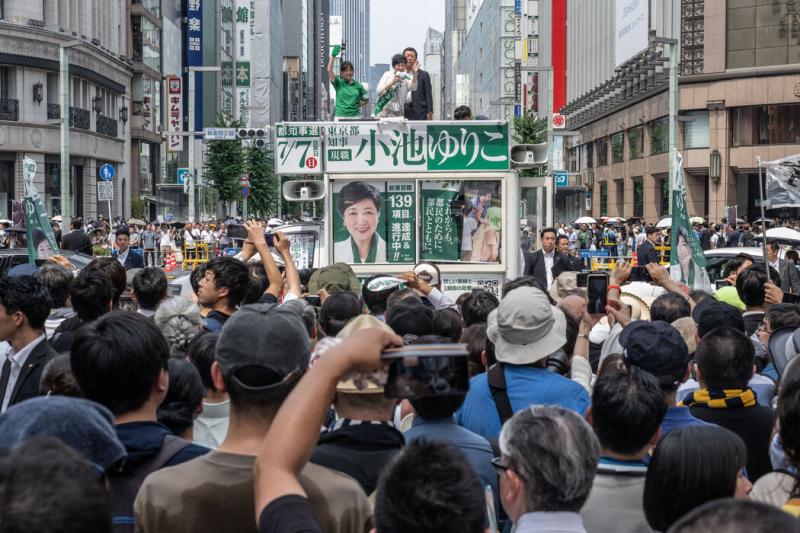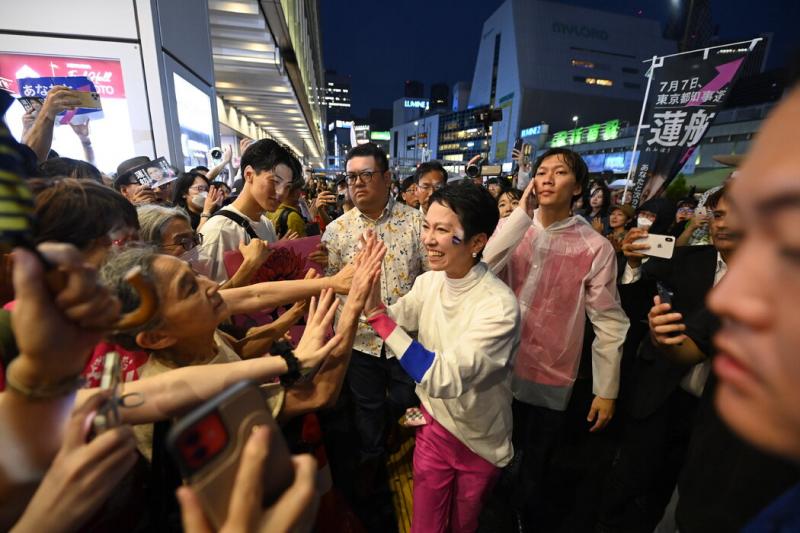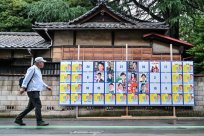
On Sunday, when Tokyo voters voted to elected the world's largest cities, they had many options.
A total of 56 candidates competed for the position, setting a record.A person who claims to be a "clown" proposes to the legalization of cannabis and states that the multi -wife system can solve the problem of decline in the birth rate of the country.The other was a professional wrestler. He hid his face in front of the camera and vowed to complete government tasks with artificial intelligence.A 96 -year -old inventor said he would launch non -emission carbon gasoline fuel cars, and a 31 -year -old entrepreneur took off his shirt in the campaign video and promised to do "interesting things."
This looks like democracy is out of control.But in fact, this campaign completely maintained the status quo, and the current knowledge of Xiaochi Koichi won the third term without expected.
Xiaochi's victory injected an urgent need for the Liberal Democratic Party to support her election.The support rate of the Liberal Democratic Party has been declining, and the election of Tokyo's awareness of the affairs has been regarded as a determination to the people of the Japanese government to a certain extent.
The surge in candidates may reflect people's tiredness of politics as ever, but many candidates who only pay attention to their attention are not a sincere campaign.and.
Emma Dalton, a senior lecturer at Melbourne Melbourne University in Melbourne, Australia, said: "I don't know if this is the role of democracy or democracy," Go to you "." Many candidatesIn the "most vulgar way", he criticized the current Kobawa Kobawa lily."Because they knew she would win," Dalton said before the election.

Tokyo's election is a microcosm of Japanese politics.Since 1955, the Liberal Democratic Party has been governing all over the country.The Liberal Democratic Party has been firmly controlled by the Japanese Parliament. Although there are many scandals, voters generally express dissatisfaction in public opinion surveys, but they are rarely reflected in voting.
The university degree of Xiaochi Lily, a 71 -year -old, has been questioned. She refuses to respond to allegations related to her large real estate developer, and the developer has participated in several controversial projects.However, just as the Liberal Democratic Party continues to administration with low support, she may also benefit from a feeling -in a relatively prosperous period, there is no need to create trouble.
Yamaguchi Erlang, a political scientist at Tokyo, said that despite inequality and poverty are continuously expanding, "most middle -class citizens are satisfied with their lives in Tokyo."
Although Koike Lily did not fully fulfill the problem of limited number of Nikko Center places, reduce the congestion of commuting trains, and cancel the municipal workers' overtime commitment, she used the budget surplus to provide subsidies for families with children, and provided private high schools in the city.Tuition fees.
Xiaochi Huruko refused the interview request.The developer who participated in the disputed construction project Mitsui Real Estate said in an email that the company had no close relationship with the affairs and did not "get any special care."
At first, Kobawa Huruko seemed to face severe challenges: Japan's largest opposition party leader and 56 -year -old Lotus Lotus resigned from the parliamentary seat and prepared to participate in the campaign.But many candidates have dispersed her attention to her.

As the first female party of the opposition party, Lian Yan is well known in Japan.She tried to emphasize the need to increase the salary of young workers and control government expenditure, so as to distinguish herself with Koike lily.But she also criticized the Liberal Democratic Party's financial scandal that had nothing to do with Tokyo.
The University of Tokyo's political scientist Kennis McLene said that focusing on the Liberal Democratic Party is a "saving method."The danger is, "This is the reason why this is not to vote for Xiaochi, but it is also a reason for voting to more than 50 challengers."
Other candidates also criticized the national government.Heheyouyou appeared in the campaign video of the public broadcasting company's NHK. His hair was messy, his face was white, his lips were red, and his lips were painted red. He imitated the clown in the Batman series and slammed the tax increase plan for Japanese Prime Minister Kishida.
"Prime Minister, before you increase taxes, you must sell the Rolex on your wrist!" He screamed and laughed at the table.
The campaign rules allow anyone who pays about $ 19,000 to run for campaign, and gives each candidate for two or six minutes of NHK broadcast period, as well as a brand of the 14,000 official campaign billboards in the city.Posted on the post.
Although the purpose of this is to create a fair competitive environment for political participation, this system is used by some people to convey information that has nothing to do with politics to a large number of listeners.

During a campaign broadcast on NHK, young entrepreneur Aoi Aili took off the striped butt shirt to expose the cleavage under the milky white vest."I'm not only cute," she said softly, inviting potential voters to contact her on LINE, a popular instant messaging application in Japan."I'm still sexy, right?"
Inside Ai Lili has received the support of "protecting the people from NHK to infringe the party". This is a rebellious organization that supports nearly half of the candidates for insiders.The organization allows their candidates and others to post a campaign poster with cats or cartoon animals on the official election signboard.
Some candidates use the live broadcast time to express general opinions, such as the welfare treatment of foreign workers in Japan, or the right to oppose the transgender people.
The number of candidates is enough to suppress strong opposition.Jeffrey Hall, a lecturer in Political Science University in Katsui Foreign Languages, said that because all paid advertisements were banned, "mainstream candidates could not enlarge their information to the level of the voice that can be drowned for the voices of the candidate."
The interference brought by this approach is obvious.In the public opinion survey, Lianyu seemed to compete with 41 -year -old Shi Maru to compete for the second place.Shi Maru is a former knowledge of a city in Hiroshima County. He said at a rally last week that he was the "idol" of supporters.
Shi Maru can't get any campaign programs, but his popularity on Tiktok and YouTube helped him win the support of young voters. His votes were second only to Kobawa lily.
Nakano Nakano, a political scientist at Tokyo Shangzhi University, said that such candidates represent Japanese populism.He also said that many "unlicensed candidates" did not expect to win.
"In this era, reputation is business," Nakano said."Having any form of fame will bring more business opportunities."
As a person trying to lead a severe challenge, the voters faced by Lian Yan are not as much as they support her, it is better to lose interest in the current knowledge.
Participating in a rally university lecturer at Lianyu in a rally of Lianyu said that she did not like the attitude of Xiaochi Lily "disrespect" other races or LGBTQ people.
But the real reason for her opposition to Koike Yuriko is "the three term are too long."
As the current knowledge, Koike lily has a great advantage: never failed in the election.She also benefited from the obedience of the news media.Although the media surveyed the rumors of her graduation degree in Cairo University, she did not investigate that she was favored by her in the construction contract.The allegations of the Fa Mori Mitsui Real Estate.
One possible reason is that both the two largest newspaper newspapers and Asahi news in Japan have invested in one of the construction projects.




